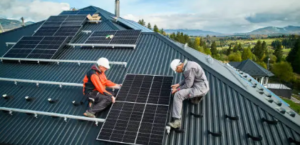Purchasing a residential solar system is a substantial investment. Doing your research is crucial, especially when it comes to comparing installers and products.
A solar system can only produce electricity while the sun is shining. The table below provides an overview of how much energy standard household solar system sizes should generate, assuming they are north-facing and 75% efficient. For more information about the solar systems cost in Adelaide, click here.
Installation
 A solar power system is a great way to reduce your energy bills, improve your home’s value, and help the environment. It’s also a good idea to invest in a solar battery for extra savings.
A solar power system is a great way to reduce your energy bills, improve your home’s value, and help the environment. It’s also a good idea to invest in a solar battery for extra savings.
The cost of your Adelaide solar system will depend on several factors, including the size and quality of the panels and inverters you choose. Lower prices don’t always indicate lower quality, but you should still proceed with caution. Remember that a system should last 25 years, with inverter replacements every 7-10 years.
This rate includes the STC subsidy & and battery offer based on standard single-storey installation in the Adelaide metro (including some regional areas). Backup & switchboard alterations not included.
Panels
When comparing Adelaide solar systems costs, keep in mind that a higher-quality system will last longer. The lifespan of a rooftop solar system is mainly dependent on the quality of components, proper installation, and regular maintenance.
In general, a 6.6kW solar system can produce between 1 and 5kWh of energy per hour at peak sun. This amount depends on the type and size of your home, as well as its location and climate conditions.
Inverters
Inverters are the unsung heroes of solar systems, converting DC power generated by solar panels into AC power that can be used in the home. They also select the most productive operating voltage for your panels according to your local climate conditions. Choose an inverter with a high-efficiency rating, as well as one that supports a range of energy management features like load prioritisation and peak shaving.
If you have a battery storage system in Adelaide, it is essential to use an inverter that is designed to integrate with storage solutions. Hybrid inverters allow you to manage your energy use and battery capacity effectively, reducing reliance on the grid and maximising your energy independence. The inverter you choose should also have scalable expansion capabilities so you can expand your solar power system as your needs change.
Batteries
Energy security, or blackout protection, is one of the significant reasons that Adelaide property owners choose to install solar battery storage systems. The system will ensure that essential circuits, such as lights, machinery, ducted air-conditioners, telephone and security systems, continue working in the event of a power outage. For more information about the solar systems cost in Adelaide, click here.
A well-designed, appropriate-sized solar power system will generate enough electricity to offset your daytime power consumption, reducing your dependence on the grid and significantly lowering your power bills. It will also allow you to export excess energy back into the grid and benefit from the feed-in tariff currently available in South Australia.
The cost of a solar power system will depend on several factors, including the size and quality of your panel selection, the installer’s rates, and rebates. Choosing the right solar panel installer is essential to maximise your savings.
STC rebate
The Australian government offers financial incentives in the form of Small-scale Technology Certificates (STC) to help reduce upfront costs for solar power systems. The STC rebate is typically deducted from your installation price, and the amount you receive depends on your location, system size, and solar energy zone rating.
When comparing solar quotes, it is also essential to take into account the equipment and financing options available. Some equipment, such as a battery or EV charger, may add to the overall price of the system but can be essential for your specific circumstances. Likewise, different inverters can impact your quote price, with string inverters usually being less expensive than microinverters.
